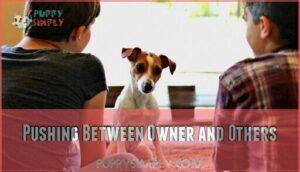This site is supported by our readers. We may earn a commission, at no cost to you, if you purchase through links.

You’ll notice jealous behaviors like pushing between you and others, vocal protests through barking or whining, and even resource guarding. These smart dogs don’t just sulk quietly; they’ll actively interfere when they feel someone’s stealing their spotlight. Their loyalty runs deep, but so does their need for attention.
The key lies in recognizing these behavioral patterns early, because understanding the "why" behind their green-eyed monster moments opens the door to effective management strategies.
Table Of Contents
Key Takeaways
- Your Jack Russell’s jealous behaviors—like pushing between you and others, whining, or resource guarding—aren’t spite but authentic emotional reactions rooted in their territorial instincts and deep loyalty to you.
- You’ll recognize jealousy through specific warning signs, including vocal protests, physical interference, destructive actions, and attention-seeking behaviors that can escalate without proper management.
- Consistent training with positive reinforcement, early socialization, and providing adequate mental stimulation and exercise are your most effective tools for preventing and managing jealous behaviors.
- You should seek professional help when jealousy escalates to persistent aggression, biting, or when your current management strategies aren’t working after several weeks of consistent effort.
Do Jack Russells Get Jealous?
Yes, Jack Russells absolutely get jealous. These terriers possess exceptional emotional intelligence that rivals young children’s social complexity. Scientific studies confirm dogs experience jealousy-like behaviors when their primary bond feels threatened.
Your Jack Russell’s breed characteristics include intense loyalty and determination, making them prone to jealous behavior when you give attention to other pets or people. Their high intelligence means they quickly notice changes in your attention patterns.
Without proper training strategies, this natural possessiveness can escalate into aggression or dominant behaviors that require firm discipline and control. The breed’s territorial nature amplifies these responses. Your terrier isn’t being dramatic—they’re displaying authentic emotional reactions rooted in their deep attachment to you. Understanding this helps you recognize that jealousy is normal canine behavior, not defiance or spite.
Your Jack Russell’s jealousy isn’t spite—it’s authentic emotional attachment that can escalate without proper training
Common Signs of Jealousy in Jack Russells
You’ll notice specific behavioral patterns when your Jack Russell feels threatened by competition for your attention. These observable signs include physical interference like pushing between you and others, vocal protests through barking or whining, and attention-seeking behaviors.
These actions can escalate to destructive actions if left unaddressed.
Growling or Barking at Other Animals or People
When your Jack Russell growls or barks at other pets or visitors, you’re witnessing classic jealousy in action. This vocal aggression often stems from fear-based reactions to perceived threats in their social hierarchy.
Your dog’s canine body language – stiff posture, direct stare, raised hackles – signals they’re asserting control over resources like your attention.
These aggression triggers require immediate discipline through consistent obedience training to prevent dominant behaviors from escalating.
Snapping, Biting, or Guarding Behavior
When vocalizations escalate into physical contact, you’re witnessing resource protection and guarding behavior. This dominant response shows your Jack Russell views certain items, spaces, or people as theirs alone. Without proper discipline and bite inhibition training, these territorial marking behaviors can become dangerous aggression triggers requiring immediate control and obedience work.
- Snapping at hands reaching for food bowls or favorite toys
- Biting when moved from preferred sleeping spots or furniture
- Guarding their owner from other pets or family members
- Blocking access to doorways, stairs, or specific rooms
Pushing Between Owner and Others
When your Jack Russell physically inserts themselves between you and another person or pet, they’re displaying classic pushy behavior rooted in social rivalry. This attention-seeking stems from protective instincts and dominant tendencies.
| Behavior | Meaning |
|---|---|
| Body blocking visitors | Asserting control over social interactions |
| Nudging other pets away | Establishing alpha status through discipline |
| Wedging between family members | Claiming primary caregiver position |
| Interrupting affection given to others | Boundary setting through physical presence |
This territorial response requires consistent aggression management and clear hierarchy establishment.
Following and Whining for Attention
When your Jack Russell becomes your shadow, trailing you room to room while whining persistently, you’re witnessing classic attention-seeking behavior. This excessive following often stems from separation anxiety or their need to maintain alpha control over your interactions.
- Constant shadowing with anxious whining when you interact with others
- Excessive barking demands when they feel ignored or displaced
- Persistent vocalizations that escalate until they receive your attention
Regular exercise helps reduce this clingy behavior by channeling their energy constructively.
Destructive or Attention-Seeking Actions
When your Jack Russell’s whining escalates, destructive behavior often follows. You might find chewed furniture, torn cushions, or indoor accidents after giving attention to others.
This attention-seeking escalates when they feel ignored or threatened by rivals. Resource guarding intensifies during jealousy episodes, with your terrier becoming possessive over toys or spaces.
These compulsive actions signal separation anxiety and loss of control, requiring immediate intervention through structured exercise and alpha-establishing training to redirect their aggressive energy constructively.
Why Jack Russells Display Jealous Behaviors
Your Jack Russell’s jealous behaviors stem from their breed’s natural territorial instincts and exceptional emotional intelligence. These smart terriers form intense bonds with their owners and quickly notice when attention shifts to other pets or people, triggering protective responses rooted in their working dog heritage.
Territorial and Protective Instincts
Throughout their lineage, Jack Russell terriers developed fierce territorial instincts that fuel jealous behaviors today. This breed’s history as working dogs created deep-rooted patterns of space defense and boundary setting. Your terrier’s protective nature kicks into overdrive when they perceive threats to their social bonds or resources.
- Your Jack Russell views you as their most precious resource to guard
- Territorial marking increases when new people or pets enter their domain
- Resource guarding extends beyond food to include favorite sleeping spots
- Protective instincts trigger aggressive posturing during perceived invasions
- Control-seeking behaviors emerge when their established boundaries feel threatened
Regular exercise helps channel these territorial drives constructively, reducing jealousy-fueled aggression.
High Intelligence and Emotional Sensitivity
Smart breeds like Jack Russells pick up on subtle emotional cues you might miss. Their heightened Intelligence Factors make them quick to read your mood shifts and social dynamics.
This Emotional Awareness, combined with keen Sensory Stimulation processing, creates dogs who notice when attention flows elsewhere.
These terrier traits intensify Social Complexity, making jealousy responses more intense than calmer breeds.
Lack of Socialization or Mental Stimulation
Insufficient socialization during puppyhood creates a perfect storm for jealousy issues. Your Jack Russell needs regular exposure to different people, animals, and situations to develop confidence.
Without proper mental stimulation through puzzle toys, training, or interactive games, boredom sets in. A bored terrier channels that pent-up energy into possessive behaviors and aggression.
Environmental enrichment and consistent exercise prevent these territorial outbursts from developing.
Changes in Household Dynamics
Major household transitions can trigger intense jealousy in your Jack Russell. New pet introduction often sparks territorial aggression, especially with same-sex animals competing for your attention. Owner absence disruptions and relationship changes upset established routines.
When family structure shifts—like welcoming babies or partners—your dog may guard you more fiercely. Without adequate exercise and mental stimulation during these transitions, jealous behaviors intensify considerably. Understanding dog jealousy behaviors is vital to addressing these issues effectively.
How to Manage Jealousy in Jack Russells
You can effectively reduce jealous behaviors in your Jack Russell through consistent training and structured management techniques. Early intervention with positive reinforcement and clear boundaries prevents these natural protective instincts from escalating into problematic behaviors.
Early Socialization and Positive Reinforcement
Social learning begins in puppyhood. Start puppy training early with reward systems that reinforce calm behavior around other pets and people. Canine development thrives on positive behavioral conditioning.
When your Jack Russell displays jealous aggression, redirect their energy through exercise and reward appropriate responses. Consistent positive reinforcement creates lasting behavioral changes, preventing jealousy from escalating into serious behavioral issues.
Setting Boundaries and Training Commands
Effective boundary setting starts with consistent command training that establishes clear expectations. Your Jack Russell needs to understand basic obedience exercises that interrupt jealous behaviors before they escalate into aggression.
Essential commands include:
- "Wait" – teaches patience during feeding or attention-giving moments
- "Place" – directs your dog to a designated spot when emotions run high
- "Leave it" – stops resource guarding or possessive behaviors immediately
Use reward systems to reinforce positive canine communication patterns. Practice these commands daily, rewarding calm behavior around triggers.
Providing Physical and Mental Enrichment
A tired Jack Russell is a well-behaved Jack Russell. Your dog’s Exercise Needs require at least 30-60 minutes of daily activity to burn off that famous terrier energy.
Mental Stimulation through puzzle toys and training sessions keeps their sharp minds occupied. Mix up Playtime Activities with fetch, agility courses, or hide-and-seek games.
Socialization Techniques like controlled meetups with other dogs reduce jealous reactions. These Enrichment Strategies transform potential troublemakers into content companions.
Creating a Safe, Designated Space
When your Jack Russell feels overwhelmed by jealousy triggers, having designated Safe Zones becomes essential. Set up Quiet Areas using Dog Crates or cozy corners where they can decompress.
These Personal Spaces act like emotional reset buttons—think of them as your dog’s private retreat. Calming Environments with soft bedding and familiar scents help reduce territorial stress and create positive associations with solitude.
When to Seek Professional Help
You’ll need professional guidance when your Jack Russell’s jealous behaviors escalate to persistent aggression, resource guarding that involves snapping or biting, or when management strategies aren’t reducing the problematic behaviors after several weeks of consistent effort.
A certified dog behaviorist or trainer experienced with terrier breeds can assess underlying anxiety disorders and create personalized intervention plans that address your dog’s specific triggers and behavioral patterns.
Consulting a Dog Trainer or Behaviorist
Professional guidance becomes essential when jealousy-related behaviors escalate beyond basic management techniques. A certified animal behaviorist or experienced trainer can assess your dog’s specific triggers and develop personalized intervention strategies.
Consider professional canine coaching when you notice:
- Aggressive escalation – snapping or biting during jealous episodes
- Persistent destructive behaviors – despite consistent training efforts
- Multiple behavioral issues – combining jealousy with other problematic patterns
- Safety concerns – around children or other pets
- Training plateau – when your current dog training methods aren’t working
Behaviorist consultation typically involves a thorough evaluation of your Jack Russell’s environment, triggers, and behavioral history. Look for professionals with terrier experience, as these dogs require specialized approaches that account for their intelligence and stubborn streak.
Addressing Underlying Anxiety or Aggression
Sometimes jealousy masks deeper issues like chronic anxiety or fear-based aggression. If your Jack Russell’s possessive behavior escalates despite training efforts, underlying Anxiety Triggers may need professional assessment.
Behavioral Therapy can identify root causes while teaching Emotional Regulation techniques. Effective Aggression Management treats medical conditions, past trauma, or inherited temperament factors. Stress Reduction protocols help create lasting behavioral change.
Understanding the dog’s nervous energy patterns is essential for developing a customized approach to manage anxiety and aggression.
Customizing Management Strategies for Your Dog
Every Jack Russell’s unique personality requires specialized Dog Training Methods that address their specific triggers and responses. A professional behaviorist will assess your dog’s Breed Specific Needs, developing Personalized Exercise Plans that channel energy productively.
They’ll establish Pet Owner Boundaries while providing Canine Emotional Support strategies that work for your household dynamics, creating a roadmap that fits your terrier’s individual quirks perfectly.
Frequently Asked Questions (FAQs)
Can Jack Russells get jealous of newborn babies?
Yes, you’ll likely notice your Jack Russell displaying possessive behaviors around newborn babies. They’re naturally territorial and may crowd between you and the baby, seeking attention through barking or pushy actions when feeling displaced.
Do male Jack Russells show more jealousy than females?
Looking at the available research and behavioral observations, there isn’t strong evidence that male Jack Russells show more jealousy than females. Individual personality, training, and socialization matter more than gender.
Can Jack Russells get jealous of their owners phone?
Your Jack Russell absolutely can get jealous of your phone. These attention-seeking terriers will demand your focus when they notice you’re glued to your device. They’ll nudge, paw, or even climb on you until you put that phone down.
Do Jack Russells stay jealous after other pets leave?
Wonder if your terrier holds grudges? **Jack Russells can remain jealous even after other pets leave the house.
** Their strong emotional intelligence means they’ll continue displaying attention-seeking behaviors and possessive tendencies until you re-establish your bond through consistent interaction.
Conclusion
Managing Jack Russell jealousy isn’t rocket science—it’s absolutely achievable with the right approach. Understanding that Jack Russells do get jealous helps you recognize warning signs before they escalate into serious behavioral issues.
Consistent training, proper socialization, and mental stimulation address the root causes of jealous behaviors. Remember, your terrier’s protective instincts stem from loyalty, not malice.
With patience and structured boundaries, you’ll transform that green-eyed monster into a well-adjusted companion who shares your attention gracefully.
- https://russellrescue.org/aggression-in-jrts/
- https://www.poochandmutt.co.uk/blogs/by-breed/jack-russell-terrier
- https://www.pets4homes.co.uk/pet-advice/five-universal-personality-traits-of-the-jack-russell-terrier.html
- https://pmc.ncbi.nlm.nih.gov/articles/PMC4108309/
- https://today.ucsd.edu/story/dog_jealousy_study_suggests_primordial_origins_for_the_green_eyed_monster

















